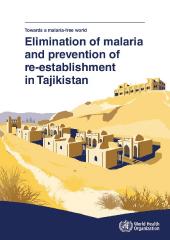Overview
This publication presents the history of malaria in Tajikistan. It focuses on evaluating the policies and strategies applied to contain malaria epidemics in the 1990s and early 2000s after the re-establishment of local transmission, to eliminate malaria and subsequently to maintain the country’s malaria-free status. Tajikistan achieved malaria elimination through the coordinated efforts of the health system, other sectors, and the entire population. This was made possible by well-designed, meticulously organized interventions and sustained financial investments over an extended period.
After being certified malaria-free by WHO in 2023, Tajikistan maintained a well-organized surveillance system and effective preventive activities, which are crucial for preventing malaria resurgence.
The main objective of this publication is to document the expertise accumulated in Tajikistan on achieving malaria elimination and maintaining malaria-free status. Lessons are distilled for countries that are working toward elimination or seeking to prevent the re-establishment of malaria.
